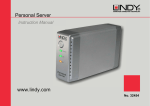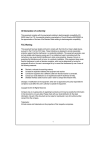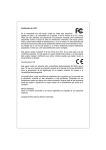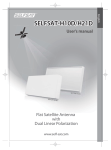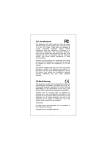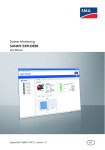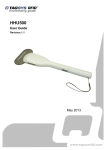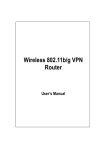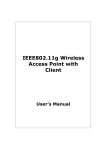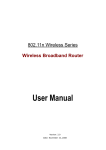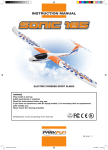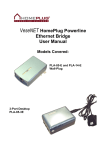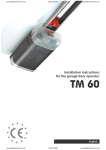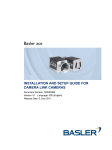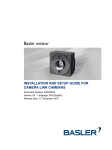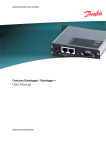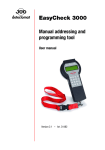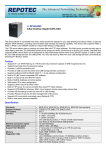Download FCC Certifications CE Mark Warning
Transcript
FCC Certifications This Equipment has been tested and found to comply with the limits for a Class B digital device, pursuant to part 15 of the FCC Rules. These limits are designed to provide reasonable protection against harmful interference when the equipment is operated in a commercial environment. This equipment generates, uses, and can radiate radio frequency energy and, if not installed and used in accordance with the instruction manual, may cause harmful interference to radio communications. Operation of this equipment in a residential area is likely to cause harmful interference in which case the user will be required to correct the interference at his own expense. This device complies with Part 15 of the FCC Rules. Operation is subject to the following two conditions: (1) this device may not cause harmful interference, and (2) this device must accept any interference received; including interference that may cause undesired operation. CE Mark Warning This equipment complies with the requirements relating to electromagnetic compatibility, EN 55022 class B for ITE, the essential protection requirement of Council Directive 89/336/EEC on the approximation of the laws of the Member States relating to electromagnetic compatibility. Company has an on-going policy of upgrading its products and it may be possible that information in this document is not up-to-date. Please check with your local distributors for the latest information. No part of this document can be copied or reproduced in any form without written consent from the company. Trademarks: All trade names and trademarks are the properties of their respective companies. Copyright © 2005, All Rights Reserved. TABLE OF CONTENT INTRODUCTION........................................................................................................3 Key Features ..................................................................................................................... 3 UNPACKING INFORMATION.................................................................................4 HARDWARE GUIDE..................................................................................................5 Front Panel........................................................................................................................ 5 Power Button..................................................................................................................... 5 LEDs Definition.................................................................................................................. 5 Rear Panel ........................................................................................................................ 5 IP PROTOCOL SETUP ..............................................................................................6 HARD DISK INSTALLATION................................................................................13 QUICK SETUP WIZARD ........................................................................................15 MANAGEMENT GUIDE .........................................................................................23 SETUP THE PERSONAL SERVER .......................................................................................23 Home Page ..................................................................................................................... 24 Home............................................................................................................................... 25 NETWORKING ...............................................................................................................27 Host Name ...................................................................................................................... 27 IP address ....................................................................................................................... 28 SuperUser/ Password ..................................................................................................... 28 IP Filter ............................................................................................................................ 29 MAC Filter ....................................................................................................................... 30 ADMINISTRATION ...........................................................................................................31 Restart System................................................................................................................ 31 Format HD....................................................................................................................... 32 Factory Default ................................................................................................................ 33 Firmware update ............................................................................................................. 33 System Time.................................................................................................................... 33 Character Set .................................................................................................................. 34 SHARE ........................................................................................................................35 User configuration ........................................................................................................... 35 Folder Configuration........................................................................................................ 37 FTP ...........................................................................................................................39 FTP Configuration ........................................................................................................... 39 P2P ...........................................................................................................................40 BitTorrent Configuration................................................................................................... 41 Download Configuration .................................................................................................. 42 WEB SERVER ..............................................................................................................45 APPLICATION..........................................................................................................47 1 TROUBLE SHOOTING GUIDE .............................................................................50 SPECIFICATION ......................................................................................................52 2 Introduction Powerful and Easy Easily fit your data sharing and storage demand, this Personal Server features with compact, economical and powerful NAS (Network Attached Storage), especially suitable for your small business, SOHO (Small Office or Home Office) or personal requirement and it’s highly integrated to work as your Web Server, FTP server. In addition to those fascinating storage and sharing features, the embedded BitTorrent client also brings you a terrific performance on downloading your favorite Multimedia!! Smart Wizard Not acquainted with Hi-tech stuff? Got exhausted to deal with those annoying settings? Take a try on Personal Server! The three powerful auto installation features, HD Auto detection, Pre-defined User Accounts, and Auto Networking Setting, make the procedure to install and use the Personal Server a piece of cake! All you have to do is connect your HD to LAN and turn it on. Now, you’ve been ready to enjoy the time with the Personal Server with our setup Wizard! Key Features Provides one 10/100Mbps Ethernet port (Auto MDI/MDIX supported) for network connection WEB-based User Interface (UI) for easy configuration Supports ATA/ATAPI-6 HD Supports all 3.5” IDE HD up to 250GB with EXT3 file format. Built-in FTP server for FTP client to transfer files conveniently. Built-in BitTorrent Client for users to download files Built-in Web server which supports one website construction. Provide website templates for easy website build-up. Support Unicode to be compatible with fonts of different language. Support Hard Disk replaceable feature Auto Networking Configuration Utility for Windows OS Supports CIFS/SMB for Microsoft Network remote users easily retrieve files by using “My Neighborhood” Compatible with Windows 95 /98 /98SE /ME /XP /2000 /NT4.0/Linux/ MAC OS Provides one reset to factory default button. Support firmware update from Web-based User Interface (UI) Provide three Pre-defined User levels, all / power / guest for accessing HD. Provides five online users of Samba (Concurrently connected) and five online FTP users (Concurrently connected) Auto-detect HD for new installed HD (Only for the 1st EXT3 partition) Provides Password security for WEB management & HD Access FCC, CE, VCCI Class B 3 Unpacking Information Thank you for purchasing this product. Before you move on, please verify your package contains the following items: 1. 2. 3. 4. 5. 6. One Personal Server (Hard Disk not Included) One Power adapter One QIG One Utility/Manual CD-ROM Rubber foot x 4 Screws for HD Fastening x 4 4 Hardware Guide Front Panel Power Button To activate the Personal Server, Press this Power button after connecting the device to an appropriate power outlet with the provided power cord. To power off, press the button for two seconds until Power LED start to blink. LEDs Definition LED Power LAN HD Status ON /OFF Boot/Shutdown: Ethernet Connected Ethernet Not Connected Ethernet Data transferring Data Transfer Rear Panel Reset Button To restore the default setting, press the button to activate LAN Port Connected with the RJ-45 cable Power Supply External power adapter DC 12V/3A. 5 Green/Dark Blinking Green Dark Blinking Amber/Blinking IP Protocol Setup Configuring the network protocols For users to launch the device easily, we provide a convenient Express Setup Wizard, which detects the Personal Server automatically in your LAN. To function the Wizard correctly, please make sure that your PC DOES NOT obtain IP address automatically or the Wizard will not be able to initialize the setup procedure according to your network settings. To solve the problem, you can either specify your PC with static IP or connect your PC to a router with DHCP server embedded. The following chapter indicates how to configure an IP address for your PC. Users that have got a specified IP, please skip this chapter to “Hard Disk Installation” for the next step. How to configure the TCP/IP network protocol of your PC Before the following IP protocol settings, you have to get an IP address in advance. If you don’t have any IP address or you are not going to access the Personal Server via our Express Setup Wizard for your desire, please choose an IP between 192.168.1.2~255 as your IP address. Please DO NOT choose 192.168.1.1 for the IP address (192.168.1.1) has been set as the default for the network device. In the following TCP/IP configuration guide, the IP address “192.168.1.2 ” is assumed to be your IP address. 6 How to configure the TCP/IP network protocol Windows 98/Me: 1. Click on Start-> Settings-> Control Panel-> Network. 2. Click “TCP/IP -> (Your Ethernet Adaptor)” then click Properties. 7 3. Click IP Address and click on “Specify an IP Address”. 4. Type in the IP address. State the subnet mask to be 255.255.255.0. 5. Click OK and OK. Now, the system may ask for your Windows disc, follow the steps then restart your computer. 8 How to configure the TCP/IP network protocol Windows 2000: 1. Click on Start-> Settings-> Network and dial-up connections. 2. Choose local area Connection and click Properties. 9 3. Click on Internet protocol (TCP/IP) then click properties. 5. Select “use the following IP address”. State the subnet mask to be 255.255.255.0. Click OK and OK then restart your computer. 10 How to configure the TCP/IP network protocol Windows XP: 1. If you are in Classic Start menu view, click Start->Settings->Control Panel->Network Connections. If you are in Start menu view, click Start->Control Panel->Network Connections. 2. Double click “Local Area Connection” 3. Choose Internet Protocol (TCP/IP) then click Properties and then click ‘Use the following IP Address’. 11 4. Key in the IP Address that you chose earlier. The subnet mask is entered automatically on Windows XP. Click OK. Now, the IP setting of your PC is completed. Please refer to the following guide to finish the Hard Disk installation and Express setup wizard. 12 Hard Disk Installation Install a hard disk drive in the Personal Server. 1. Loosen the two screws on the rear panel with a screwdriver. Screws 2. Grab the front panel and pull the foundation out of the case. 3. Please make sure that the HD jumper should be located for Master operation mode. Note that the jumper locations differ from each HD; for the correct Jumper settings, please refer to your Hard Disk manual for detail information. Insert the IDE connector into the IDE socket of the Hard Disk. Make sure the pin 1 on the cable is connected to pin 1 on the HD socket. Pin 1 is the red or pink strip on the edge of an IDE cable. The IDE cable connector is designed to fit the shape of most HD connectors in one way. 4. IDE Connector 13 5. Push the power connector into the power socket of HD that shown below. The power cable is designed to go in one way, please check the shape for the correct installation. Power Connector 6. 7. Secure the Hard Disk with the provided screws Push the Hard disk and HD holder back into the case and secure it with the two screws 14 Quick Setup Wizard The Quick Setup Wizard provides an installation guide from cable attaching to the initialization of management. Please follow up the steps below to proceed. Note: If you’ve run the wizard before and there is currently any existing shortcut for accessing or managing the device, please delete them to run the Quick Setup Wizard successfully. Starting the Express Setup Wizard: Insert the provided utility CD into your CD-ROM. The main menu pops up automatically. You may read the user’s manual by clicking “View User’s Manual” or start the Setup Wizard by clicking “Quick Setup Wizard” Note: If the auto-run program is not activated, please click on “My Computer” then click the AUTORUN icon to start the main menu. 15 “CD-Drive” Step1: Activate The Utility software Click “ Quick Setup Wizard” to activate the setup utility. The startup Manu: Please Click “Next” to continue. Welcome page 16 Step2: Connect the power cord and network cable. Connect the connector side of the power cord to the AC socket located on the rear panel. Connect the power cord to an appropriate outlet. Press the power button to activate the Personal Server and confirm that the device is well powered by examining the LEDs on the front panel. Power On Connect the Personal Server and PC/Switch with Ethernet RJ-45 cable. Ensure that the LAN LED lights green LAN Connection 17 Step3: Scan network HD in your network Click Next to proceed the Personal Server scanning. Click next to proceed the Personal Server scanning HD scanning, please wait… 18 Select the Device you are going to setup then Click “Next” The Setup Wizard will take different actions according to the status of the Personal Server: Reachable Status The Setup Wizard is going to… NO The PC that runs the Setup Wizard currently cannot access this Personal Server with the present network settings. YES The PC that runs the Setup Wizard currently can access this Personal Server with the present network settings. 1.Adjust the network settings of the Personal Server to make it to be accessible by the PC. 2.Create two shortcuts to access and setup the Personal Server Create two shortcuts to access and setup the Personal Server HD Found User name/Password Reminder 19 Setting…. Please note that how the two shortcuts function. Please refer to next page for further introduction. Click “OK” to setup your Personal Server by Web-based UI or Click Cancel to Continue. 20 After the auto installation, there should be two shortcuts created on your desktop. “Setup My Personal Server” is created for users to access the embedded management web pages “ Access My Personal Server” is the Link to access the shared folder in the Personal Server. Please follow the statement below as the Personal Server accessing guide. To setup the Personal Server, please refer to the next page for management guide. Note. Express Setup Wizard will detect your HD content but only for the 1st Partition. Setup my Personal Server Setup the Personal Server by Web-based UI with Browser, ex I.E. Access my Personal Server Use the network HD of the Personal Server Icons Created Note: If an unformatted or no hard disk is installed, users will not be able to access the Personal Server by clicking the “Access My Personal Server”. But you will still be able to manage the Personal Server by clicking “Setup my Personal Server” 21 To Access this HD, Double click the “Access my Personal Server” icon to access the HD and double click a folder. The authentication window pops up. Please fill in the user name and password to get access to folders. The device provides three default accounts for users to read/writes folders in different authority levels: All=Read/Write (The account is allowed to Read/Write all the folders in Personal Server) Power=Read/Write (The account is allowed to Read/Write the “share” Folder only) Guest=Read Only (The account is allowed to Read the “share” Folder only) Note: 1. As default, the “Share” folder is created automatically in the Personal Server and can be accessed by any user. 2. Users that would like to use another set of username/ password after getting access to any folder please log off your operation system and log on again. 3. For Windows 95, 98, 98se users, please note that you should add a new user with the username of your operation system. To configure each account including adding new users, changing user name/ password or other properties, please refer to the chapter “Share” in “Management Guide”. 22 Management Guide Setup the Personal Server To configure the Personal Server via your computer with a web browser installed. Please follow up the steps below. Double click the “Setup my Personal Server” icon on your desktop screen The Username and Password Required window appears. - Enter admin in the User Name location (default value). - Enter admin in the Password location (default value). - Click “OK” button Note: If you didn’t run the Quick Setup Wizard, you should configure your IP address in the range from 192.168.1.2 to 192.168.1.255. Start your Web browser then type 192.168.1.1 to URL and press enter. 23 Home Page The Personal Server is managed via a web-based graphical user interface (GUI) that can be accessed with a standard HTML (HTTP v1.0) compliant browser. The Home page 24 Home Status Host name: the Identification of the Personal Server shows on “My Neighborhood” IP-address: the IP address of the Personal Server Version: the Firmware Version Configuration Click the hyper link of each management items to quick link to each management page. 25 Status Detail To see more info about the Personal Server, such as HD used (%), Up-time, samba users, and FTP users, please click the “Click here for more information…” IP Address: The current IP address of the Personal Server. HD used (%): the usage percentage of HD (Total amount of HD) Up-time: the estimate time that you power the Personal Server on Samba Users: the number of members who is currently using the Personal Server FTP Users: the number of members who is currently using the Personal Server by FTP client Check if the Unicode been loaded in the Personal Server Note: 1. The Personal Server provides the Maximum five online users of Samba and five online FTP users. 2. Please note that if the Unicode been loaded successfully or there may be some language errors on file name or folder name when accessing to the Personal Server. For instructions of Unicode installation, please refer to “Character Set” under “Administration” category. 26 Networking The Networking management provides users to do the setup of Host Name, IP Address, SuperUser/Password and the IP/MAC filtering function. After setting, the Personal Server will be shown on “My Neighborhood”. Host Name Item Configuration Host Name Identification of the Personal Server shown on your “My Neighborhood” Work Group The workgroup this Personal Server is located Description Brief description of the Personal Server (EX, IP address, Location etc…) 27 IP address Item Configuration DHCP Enable Click Yes to enable the Personal Server as a DHCP client. Click No to disable. IP Address IP address of the Personal Server Subnet Mask The Subnet Mask must be compatible with the other devices on your network Gateway Enter the Router or Gateway IP on your network or leave it blank DNS Server Please specify the server IP address your ISP provides SuperUser/ Password You can setup the administration User Account/Password in this page. The user name/ password is used to access the Web-based UI to Setup the Personal Server. Item Configuration SuperUser name Username of the Personal Server administrator to access the Web-based UI Old Password Enter your old password here New Password Enter the New Password here Confirm Password Enter the New Password again to confirm 28 IP Filter The IP Filter functionality provides access management by IP address filtering. There are three modes for configuration: 1. Disable: Disable the IP Filer function. All IP addresses are allowed to access the Personal Server. 2. Allowed: Setup the IP addresses that are allowed to access the Personal Server. Only the configured IP addresses have the right to access the Personal Server. 3. Denied: Setup the IP addresses that are denied to access the Personal Server. The IP addresses that are configured are not allowed to access the Personal Server. 29 MAC Filter The MAC Filter functionality provides access management by MAC address filtering. There are three modes for configuration: 1. Disable: Disable the MAC Filer function. All MAC addresses are allowed to access the Personal Server. 2. Allowed: Setup the MAC addresses that are allowed to access the Personal Server. Only the configured MAC addresses have the right to access the Personal Server. 3. Denied: Setup the MAC addresses that are denied to access the Personal Server. The MAC addresses that are configured are not allowed to access the Personal Server. 30 Administration In this page, you can manage the Personal Server with the tools to: Restart the system Format the Hard disk Restore the default setting, Update the latest Firmware Adjust the system time Support the correct code pages in SAMBA for character set Restart System To Restart the Personal Server, Click “Yes” to enact. Don’t power off the device before the system restart been completed. 31 Format HD When this massage “HD Unable to use” is found in “HD used (%)”, it represents that your Hard disk is one whole new unformatted Hard disk or your HD is not formed as EXT3 format. You will have to format the HD or replace a HD with EXT3 format Caution: All partitions on your HD will be format and all your DATA will be erased. To format the Hard disk, click “Yes” to activate. Please wait as the format proceeding. Do not power off the system or close the browser. After the completion of the format process, the system restarts automatically. 32 Factory Default To restore Personal Server to default configuration, click “Yes” to enact. Don’t power off the device during the process. Firmware update To upgrade the Firmware, 1. Click Browse… 2. Select the file for Firmware updating. 3. Click Apply Caution: Don’t power off the device or the device will be damaged. System Time 1. If your system is not connected with Internet, Click “Time Sync” to synchronize the current time with PC. 2. If your system is connected with Internet, you can use “Time Server” and select “Time Zone” to do time synchronization. Please remember to click “Save”. The correct time will be applied by next boot. 33 Character Set Unicode is working for the device to recognize most fonts around the world thus prevents errors from fonts difference. To install Unicode, insert the utility CD we provide, click the “Browse” icon, click on your CD-ROM drive, open the folder “Unicode” and select the file “ntx_chset.h”, click open to browse the file then click Save to enable. Note: Please don’t delete or do any modification on the file. 34 Share On Share page, you can manage the Users and Folders on the Personal Server. User configuration On this page, you can add/ remove users or configure the user properties. Add User 1. Click Add button 2. Enter the User Name, New password, Confirm password, User description Note: If you want to add a account for a user that use Windows 95, 98 or 98se, please use their respective username for their operation system as their username for the device. 3. Decide the FTP Access, and Accessed Level. When FTP Access is enabled, those users are allowed to access FTP with their own username and password he owned. 35 4. Choose the default folder for the user. 5. Click Apply to save Change the User configuration 1. Click the User Name link, for example, all 2. Enter the New Password; confirm Password, and Description to change the setting Delete User Remove the certain user account to ban the right from accessing the Personal Server 1. Fill in check boxes to select users that you want remove. 2. Click Delete to remove 36 Folder Configuration On the page, you can add folders, delete folders and setup the authentication of users. Add Folder To add a new Folder for file sharing: 1. Click Add to add a new Folder 2. Enter the Folder Name and Description 3. Click Apply to Save Delete Folder To remove a folder and the files within the folder 1. Select the folder you want to remove by clicking the check box 2. Click Delete to remove 37 Change the User Authentication of folder In this management page, you can configure the privilege levels for each user, ex reading or rewriting files and folders in Personal Server. Three privilege modes are provided for each user: Non-access The User is not allowed to access the folder Read-only The user is allowed to read files only in this folder Read&write The User is allowed to read and write files to or from this folder You can also do an overall authority configuration for all users toward the folder. We provide 4 authority levels: Authentication Free Access No Access for all users Only Read access for all users Read/Write access for all users 38 FTP The Personal Server support FTP functionality for users to access and up/download files with FTP software. FTP Configuration Click FTP Configuration, to set up the configuration such as user limitation, Service port number, Length for timeout, and anonymous user restriction Items Meaning How to… Maximum Unit number Port Number Maximum concurrently connected Fill in a number from 1 to 5. FTP users Decide FTP Service port Number as Enter the FTP Port number your demand A default port number 21 is configured if there is no specified number been configured. Note: Port 80 is not allowed to setup for it has been configured as the port for accessing the WEB-based management interface. Timeout The FTP time out length Enter the length you want. A default 15Min is configured if there is no specified time been configured Allow Anonymity Allow anonymous user account to Choose Yes to enable or no to disable login. Note: To add a new FTP account, please add a user in “user configuration” under the page “Share” then enable the privilege to access FTP. 39 P2P The device provides you P2P downloading with embedded BitTorrent client. To process downloading, please refer to the following procedure: 1. Get a Torrent File: The BitTorrent download is triggered by Torrent files (formatted as “XXX.torrent”). 2. Locate those Torrent files in a folder within the Personal Server. (EX, Create a folder, which named “P2P”, in the device. Place those Torrent files in the P2P folder) 3. Create a folder in the Personal Server to place the data you are going to download. Please note that the folder should be within the folder that contains the Torrent files. ( Ex Create a folder named “BT” in the “P2P” folder” 4. Start downloading. For detail configuration, please find the instructions below: Note: All users of this device are warned against illegal downloading of copyrighted materials. The P2P embedded functionality is provided for downloading authorized files only. Downloading or distribution of unauthorized materials may result in severe civil and criminal penalty. Users of this device are subject to the restrictions of the copyright laws and should accept all the consequences. 40 BitTorrent Configuration The configuration of BitTorrent can be setup here, fill in the settings in each blank then press apply to activate. Please refer to the following instructions to configure: 1. Enable BitTorrent: Choose Yes to enable the BitTorrent download or choose No to disable. 2. Download Folder: Choose the folder that contains the folder where you place the Torrent 3. 4. 5. 6. 7. files. Note: To download successfully, please make sure that the torrent files and the folder for restoring downloaded data to be in the same folder. (Ex, if you place those Torrent files in folder “share”, the folder “Multimedia” for placing downloaded data should be also in the folder “share”. BitTorrent Configuration File: You can specify any name for the file. The file is for recording the download information, which helps to resume interrupted download. Note: Please don’t delete the file after downloading Max Active Torrent Number: To set the numbers of Torrent files to be activated at the same time. A number within 10 is allowed. Scheduler: Chick Yes to enable the scheduler. The scheduler is provided for users to set up the start/end time of BitTorrent functionality. Start: Set the time to start BitTorrent download/upload. End: Set the time to end BitTorrent download/upload. (Ex you can configure the scheduler to start by “Everyday, Hour: 23, Minute: 0” and end by “Everyday, Hour: 6, Minute:0” to process BitTorrent download/upload from 11:00PM to 6:00AM) 41 Download Configuration This page is provided for users to enact a download task and also shows the downloading information. The explanations for each item is shown as following: 1. 2. 3. 4. Sel: The check box for users to select the desired download task. Torrent File: Names and status hyperlink for each Torrent file. D/L (%): Downloaded percentage Size (MB): The size of the data. 5. Start time: The time that download starts. 6. Rate (Down/UP): The download/upload speed. 7. Max Rate (Down/UP): The MAX download/upload speed. 42 To add new downloading tasks: 1. To add a new download task, place Torrent files in the folder you specified as the download folder. Select the files that waiting for download then click add. 2. Select the files for download then click next 3. Specify the folder for placing downloaded data then click next. Please verify that the folder should be within the folder you place Torrent files. 43 4.Check the download environments then click Apply to finish the procedures: The meanings for each item is listed as follows: Listen Port: The port number of the P2P program. Time to Leave: The allowed time to process a download task. The task will be terminated as the time passed. Max Peers Count: Setup the MAX Peers when proceeding up/download. Min Peers Count: Setup the Min Peers when proceeding up/download. Max Download Bandwidth: The MAX allowed download Bandwidth. Max Upload Bandwidth: The MAX allowed upload Bandwidth. (Note: A peer is a connection processing upload or download between nodes.) 5.The proceeding task and the relative information will be shown on the downloading column. Select a file in the check box then click Inactive if you want to terminate a download task. You can also click on the hyperlink of the torrent file name to check the properties of the task. 44 WEB Server Administrator WEB Server: The Administration port is the port for accessing the Web-based management interface. As default, the Port 80 is configured as the Administrator WEB Server Port. WEB Server: The WEB server allows users to construct a Website by HTML format. To activate the WEB server, click “Yes” to enable. Specify a port number from 1~65535. “WEB Folder” is the location where you place your HTML files. Note: 1. 2. As default, the Port 80 is not allowed to setup for it has been configured as the port for accessing the Web-based management interface. We also provide a Website template for you to build-up a Website and enjoy the WEB server properties easily. To use the template, access the CD we provide, copy the data in the folder “WEB Template”. Paste those data in the folder that you configured as the “WEB Folder” 45 To access the Web Server: The address for linking the WEB server is the IP address of the personal server with the port number added after by a colon. (Ex, Use 192.168.1.1:8080 when the IP address of the personal server is 192.168.1.1 and the port number of the web server is configured as 8080) Note: For WAN users to get access to the FTP or WEB server, you should link the personal server to a router with appropriate configuration. Please make sure that: 1. The NAT functionality is enabled in your router. 2. In the port-mapping session, the “Internal Host IP” should be configured as the IP address of this Personal Server and the value of “Port” should be correspond to the port number of the WEB server or FTP server you configured. (Ex, If the IP address of your personal server is 10.10.7.251, the port number of your FTP is configured as 21 and the port for Web Server is as 8888, you should add or modify a port mapping record, set the Internal Host IP address as 10.10.7.251, the Port as 21. then add or modify another port mapping record, set the Internal Host IP address as 10.10.7.251 and the Port as 8888) 3. Before allowing the device to communicate with Internet, we strongly recommend users to add a Firewall device to secure your network from being invading. 46 Application There are several applications for the Personal Server. For one user or one single PC, you can backup your important files from your PC. PC Backup Data One User For Multiple users, The Personal Server provides a convenient way for file sharing and backup by using “My Neighborhood” All you have to do is connecting the Personal Server with your switch, and you can enjoy the easy and reliable service of Personal Server. Files Sharing Remote Backup Multiple Users PC PC Server Backup For Windows 2000/XP Users, the OS provide an accessory system tool for data backup, “Backup”. Please follow the steps as the reference to complete data backup, 1. Activate the programs: clicking start button, pointing Programs, pointing Accessory, pointing system tools, and clicking Backup. 2. Click “Schedule Jobs” tab, and Select date that you want to activate the Backup Job. Click “Add Job” button 3. When The Wizard appears, Select “Create a new Job” and Click OK 47 4. Select “Back up My Computer” to backup your whole system or “Back up Selected files, folders and Driver”. If you want to backup C:\, select “Back up Selected files, folders and Driver” 5. If you want to backup one Drive, ex. C:\, select the drive by click the check box in front of the drive letter. 6. Decide the destination of backup file. 7. Type a name for this backup job and Click start. 8. Wait for the program to process the backup progress. For some circumstances, The Personal Server’s FTP function provides the possibility of remote backup. For example, you have an IP camera provides FTP feature and want to transfer video data of IP camera back to the Personal Server to fulfill the needs of remote monitoring. IP Camera Remote Backup (FTP) To use the FTP, please choose a FTP supported Browser, ex. IE 6.0. Type ftp://domain name or IP/ in Bower’s address blank and press Enter. The Authentication Windows will appear for you to input username and Password. You can find the username/password in configuration in the management web page “user configuration” under the web page “Share”. Please make sure that the privilege to access FTP is enabled. To use Personal Server as a FTP server without fixed IP or domain name, please setup your router’s DDNS and Port mapping (Virtual Sever) first. As for the setting, please refer to the DDNS and Port mapping in your router’s Manual. 48 Download The Personal Server provides more convenience for P2P downloading. The Scheduler functionality allows users to set up the time for downloading hence enables users to avoid downloading files in bandwidth rush hours. Also, after giving a download command, users are allowed to download files without keeping your PC powered on. WebServer For users wish to share files via their website, the embedded Webserver provides a easier solution. Users don’t need to worry about the limited size provided by ISP. It will be even easier by using the website template we provide. With properly locate your files and data, it’s just a snap to share your favorite photos, pictures and whatever you want to show your friends. 49 Trouble Shooting Guide 1. How to shut down the Personal Server properly? Ans. To shut down the System properly, press the Power button on the front panel for two seconds until Power LED blinks then go off. 2. The Quick Setup Wizard can’t configure My Network setting. Ans. Make sure that your RJ-45 cable is connected with the Personal Server and your PC/Switch. Check the LAN LED of Personal Server, and make sure that it’s Green. Check the power of the Personal Server, PC/Switch and make sure that it’s on. Check your PC’s IP address, make sure that it has a static IP or connects with a router with DHCP Client. As for the setting, Please refer to the “IP Protocol Setup” Chapter. The system is down. Reboot the system with Web-based UI or press the Default Button to restore the factory default setting and reboot. 3. The Personal Server can’t find my HD and the Home page of Web-based UI display that the “HD unable to use. Ans. There are some possibilities, The HD is broken. Please change another HD The HD jumper is not set as Master. Your HD jumper should be set to Master. Different Hard Disk has different jumper settings; please refer to your Hard Disk manual for more information. The HD is unformatted. Please format it with our HD Format tool in Administration. The partition format of HD is not EXT3, ex. NTFS. Please format it with the provided Format tool in Administration. 4. I use Personal Server as a Web/ FTP server, but the users that outside the LAN can’t access it. Ans. To use Personal Server as a FTP server without fixed IP or domain name, please setup your DDNS and Port Mapping of router (IP Sharing) first. As for the setting, please refer to the DDNS and Port mapping in your router’s Manual. 5. I can’t access the Personal Server. Ans. Check the LAN LED of Personal Server, and make sure that it’s Green. The system is down. Reboot the system with Web-based UI or press the Default Button to restore the Factory default setting and reboot. When the concurrently connected users are over five, the system will block other users who want to access. Please check the Samba Users / FTP Users by clicking the “Click here for more information…” on the Web-based UI. 50 6. I can’t access the Personal Server with the shortcuts created by Quick Setup Wizard. Ans. Check answers in Question 5 first. You may change the IP Address of the personal server, you may create new shortcuts by: 1. Key in \\( IP address of Personal Server) in URL then copy the shortcut in the URL to your desktop. 2. Key in http://( IP address of Personal Server) in URL then copy the shortcut in the URL to your desktop. 7. I have accessed the HD, but I can’t get access to the folders. Ans. Verify you have the correct username and password. For Windows 95, 98, 98se users, please note that you should add a new user with the username of your operation system. Please get access to the management interface. Add a new user, which use the username the same with your operation system. Get access to the HD and double click a folder. Fill in the password to get access to the folder. If you have accessed to any folder in the HD and would like to use another set of username/ password for different authority, please log off your operation system and log on again. 8. There are unrecognizable characters as the file name. Ans. If you are using the Samba mechanism (ex, My Neighborhood or the “Access my personal server” icon) to access the HD, please use the FTP to view the file. Those characters that can be recognized from FTP may not be recognized via Samba and vice versa. We recommend users to place those from FTP in the same folder. Use English characters can also prevent the problem. 51 Specification Standard IEEE 802.3, IEEE 802.3u Support Protocol TCP/IP, HTTP, SMB, FTP Support concurrently connected Users Samba: Five Users / FTP: Five Users Interface One 10/100Mbps RJ-45 Ethernet port One Default Button Connection speed 10/100Mbps Support Hard Diskette One removable 3.5” external HD (ATA) Diagnostic LEDs Power: On/Boot or Shutdown (Green/Blinking) LAN: Ethernet Act/Link (Green) HD: Hard Disk data transfer (Amber/Blinking) Dimensions 220L130W60H mm Operating Temperature Operating -- 0~40℃; Storing -- -10~65℃ Power Supply DC 12V 3A External power adapter Certification FCC (CISPR_22), CE (EN55022), VCCI Class B 52 DECLARATION OF CONFORMITY IN ACCORDANCE WITH THE RADIO AND TELECOMMUNICATIONS TERMINAL EQUIPMENT ACT (FTEG) AND DIRECTIVE 1999/5/EC (R & TTE DIRECTIVE) = European Community Conformity Mark We, Manufacturer/Importer Longshine Technologie (Europe) GmbH An der Strusbek 9 22926 Ahrensburg Germany Declare That The Product LCS-8220 Network Hard Disk Is In Conformity With: Standards Results EN 55022 :1994+A1:1995+A2:1997, Class B EN 61000-3-2:2000, Class A * (See note below) EN 61000-3-3:1995+A1 2001 EN 55024:1998+A1: 2001 +A2: 2003 IEC 61000-4-2:2001 IEC 61000-4-3:2002+A1:2002 IEC 61000-4-4:1995+A1:2000+A2:2001 IEC 61000-4-5:2001 IEC 61000-4-6:2001 IEC 61000-4-8:2001 IEC 61000-4-11:2001 Pass Pass Pass Pass Pass Pass Pass Pass Pass Pass Pass Identification of signatory empowered to bind the manufacturer or his authorized representative. Signature Manufacturer/Importer Date: 08.07.2005 Note *The power consumption of EUT is 4.430W, which is less than 75W and no limits apply Therefore it is deemed to comply with En 61000-3-2:2000 without any testing. 53 61LS-02200-207C






















































